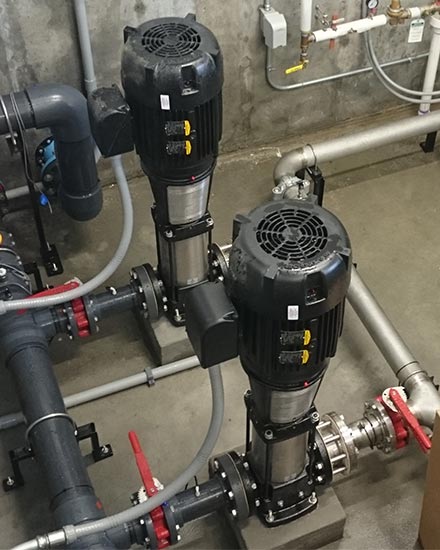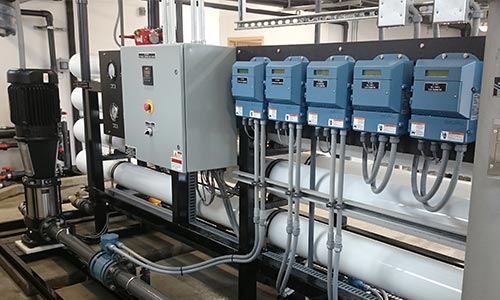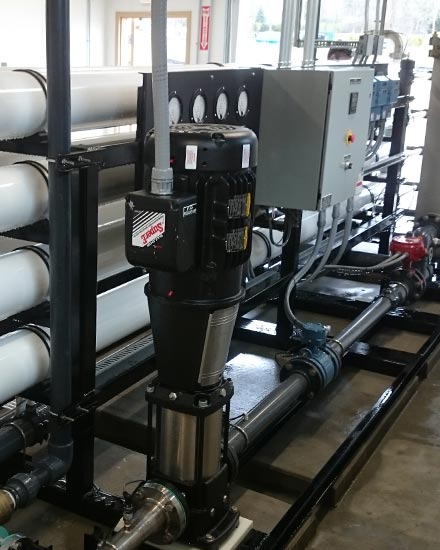Vermont-Based Water Treatment Company Builds New England’s First Nanofiltration Plant
You wouldn’t think a small, landlocked state in the Northeast would be home to a water desalination equipment and design company. Further still, you wouldn’t think that their membrane-based technologies could assist local municipalities.
Despite what you might think, ISI Water’s nanofiltration plants happened to be the perfect solution for the town of Hinesburg, Vermont and their water’s issues with high levels of calcium and magnesium.
ISI Water started out in seawater desalination, using reverse osmosis, a membrane-based separation process, to provide fresh water for municipalities, hotels and resorts, and industrial clients. ISI Water has since branched out into a broader range of water treatment systems, staying on the leading edge of technology, primarily focusing on membrane-based systems.
 The owner, Scott Shumway, who lives in Hinesburg, heard that the town was planning to install a conventional water softening plant to deal with the high levels of hardness in the municipal water supply. He proposed using a membrane system, called nanofiltration, for water softening instead.
The owner, Scott Shumway, who lives in Hinesburg, heard that the town was planning to install a conventional water softening plant to deal with the high levels of hardness in the municipal water supply. He proposed using a membrane system, called nanofiltration, for water softening instead.
“We either had to treat or remove the problem,” said Erik Bailey, Director of Utilities, Town of Hinesburg. “Nanofiltration removes the problem (minerals) in order to soften the water. It requires a bit more capital but should cost less in the long run and provide a superior product at the same time.”
Conventional water softening is an old technology that uses salts to replace the calcium and magnesium ions with more desireable ions; usually sodium. Nanofiltration uses membranes to separate certain dissolved solids (in this case, calcium and magnesium) from the water, allowing only the water and the smallest ions (sodium, chloride, and other lower charge ions) to permeate across the membranes. It is a relatively new process that has numerous applications such as removal of hardness, heavy metals, bacteria, viruses and other organics, color, and almost any harmful chemicals. Nanofiltration does not require consumables to operate, though a few food safe chemicals are used in small doses to stabilize the system and to meet health standards (pH adjustment and chlorine).
Hinesburg had been expanding slowly throughout the years and in 2015 reached a pivotal moment where an additional water source needed to be added to the town supply. Later that same year, two new wells were developed, as well as the construction of a control building connecting to the town’s distribution system. However, there was still a major issue: The water was too hard.
Most municipalities turn to antiquated technology (such as conventional water softeners) as a solution when problems like excessive hardness occur. These methods, although commonplace, use more consumables and can have high operating costs.
When ISI Water heard about the project from concerned Hinesburg residents, they offered an alternative solution to the town’s water hardness issues: Nanofiltration.
“Membrane technology is widely underused,” said Colin Masseau, Senior Engineer at ISI Water. “There is a tendency, especially in the municipal water industry, to stick with old methods that people are more comfortable with instead of updating to newer, more efficient technologies. The Town of Hinesburg was open to new ideas and was willing to give this new method a shot.”
 With high hardness, low iron, non-detect manganese, and non-detect MTBE in its wells, ISI Water knew that the town could benefit significantly from this technology. With nanofiltration able to constantly remove hardness without adding sodium, this system will improve taste and better address future compliance issues. For these reasons, the town of Hinesburg agreed that this was the perfect solution.
With high hardness, low iron, non-detect manganese, and non-detect MTBE in its wells, ISI Water knew that the town could benefit significantly from this technology. With nanofiltration able to constantly remove hardness without adding sodium, this system will improve taste and better address future compliance issues. For these reasons, the town of Hinesburg agreed that this was the perfect solution.
“Our customers had been having issues with the hardness relating to both plumbing and taste,” said Erik Bailey. “Extremely hard water clogs water heaters, for example, and it was causing people to buy their own personal softening systems. In the end, the town voted to spend the money on a treatment system to make their drinking water more palatable and less damaging to their internal pipes.”
The decision took about a year to reach, but the benefits will be significant for the town.
“The water is going to taste better, periodic discoloration will disappear, and it’s going to be much easier on their water heaters, laundry, faucets, and everything else,” said Erik Bailey. “With any luck, most of the people who are drinking bottled water will rely on the stuff coming out of the tap, which is water they’re already paying for.”
 ISI Water worked with both the town of Hinesburg and Aldrich and Elliot (A&E), an engineering consultant firm acting as project managers, throughout the project and on May 20, 2016, successfully commissioned the first nanofiltration plant in the Northeast United States for municipal water supply.
ISI Water worked with both the town of Hinesburg and Aldrich and Elliot (A&E), an engineering consultant firm acting as project managers, throughout the project and on May 20, 2016, successfully commissioned the first nanofiltration plant in the Northeast United States for municipal water supply.
The nanofiltration system is housed in a water treatment facility building located on the outskirts of the Hinesburg village and is fully automated. The nanofiltration system, and all associated equipment, was designed, built, installed, and programmed by ISI Water. The building was designed by A&E, and constructed by Naylor and Breen Builders, Inc.
The membranes for this plant have a useful life of at least five years and will be cleaned every three to four months for optimal efficiency.
Nanofiltration technology is used across the world, but it is new to New England. With widespread implementation, municipalities can experience low consumables, efficient design, a smaller footprint, no harmful chemicals, no risk of contamination, and high reliability in comparison to traditional water softening solutions.
When asked if he would recommend ISI Water to others, Erik Bailey said: “Absolutely. They know what they’re doing, are innovative, and find low-cost solutions. Other water operators should look at this technology, and ISI Water, because they’ve mostly been working overseas but they should be designing, building, and implementing plants here too. We’re the first within the local market and I don’t see us being the last.”
If you’re looking for a water treatment system that can reduce the cost of energy, consumables, and maintenance, contact ISI Water today to see if a nanofiltration system will work for your application.
